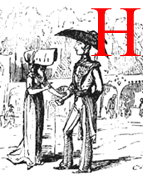
aving learned that the Secretaryship of the Literary Fund was vacant, Landon wrote to ask Crofton Croker to support her brother Whittington’s application for the post: “It would be perfect salvation for him and me”. However, according to letters published in the April 1862 Sharpe’s Magazine Croker explained that at an earlier election when Octavian Blewett had been unsuccessful, he had promised to vote for him on the next occasion, and suggested that Landon apply to Jerdan without delay, as a very active and influential member of the council and committee (190). Landon wrote letters to everyone she thought could assist her brother’s election. Despite Crofton Croker’s earlier refusal to Landon, in March Jerdan wrote to him, asking for his help. Unusually, his letter was marked “Private” and, also unusually, he addressed his friend by his first name. This was clearly a letter of grave importance to him.
My dear Crofton, I am sure that not only as a most esteemed personal friend of mine, but as one much attached to our L.E.L., you must have felt great regret at considering yourself pledged against us at the Election. It is a matter of vital consequence.
I know your honour and principles too well to have said a word before; but I merely suggest now does not Mahoney’s offer afford you a just and fair opportunity for being neutral, and the same with other friends of, Yours truly [Letitia Elizabeth Landon papers, Special Collections and University Archives, Rutgers University Libraries.]
On 8 March Landon wrote on the same matter to Jerdan: “Lord John Russell, Lord Francis Egerton and Lord Munster have all promised their support in the kindest manner – that with Sir John makes four – I hope to God the election will not come on about Easter, for then these people are all going out of town…I hope we shall get the three new council.” Held after Easter the vote was equal, until the late arrival of Lord John Russell and Sir Robert Peel who swung the vote in Landon’s favour. The result delighted and excited his sister so much that she reported “When I heard of our success the blood rushed from my nose and mouth in torrents” (April 1862 Sharpe’s Magazine).
Bibliography
Blanchard, Laman. The Life and Literary Remains of L.E.L. London: Henry Colburn, 1841.
Cross, Nigel. The Royal Literary Fund 1790-1918. London: World Microfilms, 1984.
Jerdan, William. Autobiography. 4 vols. London: Arthur Hall, Virtue & Co., 1852-53.
The Letters of Letitia Elizabeth Landon. Ed. F. J. Sypher, Delmar, New York: Scholars’ Facsimiles & Reprints, 2001.
Landon, L. E. Romance and Reality. London: Richard Bentley, 1848.
Landon, L. E. Letitia Elizabeth Landon: Selected Writings. Ed. Jerome J. McGann and D. Reiss. Broadview Literary Texts, 1997.
Lawford, Cynthia. “Diary.” London Review of Books. 22 (21 September 2000).
Lawford, Cynthia. “Turbans, Tea and Talk of Books: The Literary Parties of Elizabeth Spence and Elizabeth Benger.” CW3 Journal. Corvey Women Writers Issue No. 1, 2004.
Lawford, Cynthia. “The early life and London worlds of Letitia Elizabeth Landon., a poet performing in an age of sentiment and display.” Ph.D. dissertation, New York: City University, 2001.
Macready, William Charles. The Diaries of 1833-1851 Ed. W. Toynbee. 2 vols. London: Chapman & Hall, 1912.
McGann, J. and D. Reiss. Letitia Elizabeth Landon: Selected Writings. Broadview Literary Texts, 1997.
Pyle, Gerald. “The Literary Gazette under William Jerdan.” Ph. D. dissertation, Duke University, 1976.
Sadleir, Michael. Bulwer and his Wife: A Panorama 1803-1836. London: Constable & Co. 1931.
Sypher, F. J. Letitia Elizabeth Landon, A Biography. Ann Arbor, Michigan: Scholars’ Facsimiles & Reprints, 2004, 2nd ed. 2009.
Thomson, Katharine. Recollections of Literary Characters and Celebrated Places. 2 vols. New York: Scribner, 1874. Reprinted Kessinger Publishing.
Thrall, Miriam. Rebellious Fraser’s: Nol Yorke’s Magazine in the days of Maginn, Carlyle and Thackeray. New York: Columbia University Press, 1934.
Vizetelly, Henry. Glances back through seventy years. Kegan Paul, 1893.
Last modified 16 July 2020